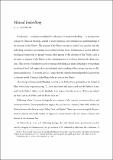Mutual Indwelling
Abstract
Perichoresis, or “mutual indwelling,” is a crucial concept in Trinitarian theology. But the philosophical underpinnings of the concept are puzzling. According to ordinary conceptions of “indwelling” or “being in,” it is incoherent to think that two entities could be in each other. In this paper, I propose a mereological way of understanding “being in,” by analogy with standard examples in contemporary metaphysics. I argue that this proposal does not conflict with the doctrine of divine simplicity, but instead affirms it. I conclude by discussing how mutual indwelling relates to the concepts of unity (modal inseparability) and identity (qualitative indiscernibility).
Citation
Cotnoir , A J 2017 , ' Mutual Indwelling ' , Faith and Philosophy , vol. 34 , no. 2 , pp. 123-151 . https://doi.org/10.5840/faithphil201741179
Publication
Faith and Philosophy
Status
Peer reviewed
ISSN
0739-7046Type
Journal article
Description
Work on this article was generously supported in the form of a Summer Stipend by the Classical Theism Project at the University of St. Thomas (MN) and the John Templeton Foundation.Collections
Items in the St Andrews Research Repository are protected by copyright, with all rights reserved, unless otherwise indicated.

